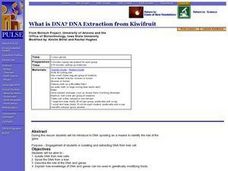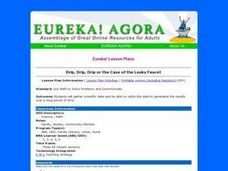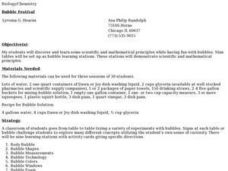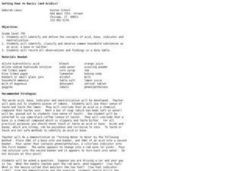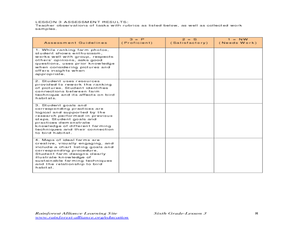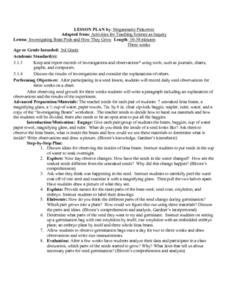Curated OER
What is DNA? DNA Extraction from Kiwifruit
Learners isolate DNA from kiwi cells, spool DNA from a kiwi, describe role of the DNA and genes, and explain how knowledge of DNA and genes can be used in genetically modifying foods.
Curated OER
Making a Soil Separator
Students investigate botany by creating a soil separating device. In this plant life lesson, students identify the needs of plants and how important the right soil is in the growing process. Students define different soil...
Curated OER
Flatworms
In this flatworms worksheet, students will review the characteristics of planarians, tapeworms, and flukes. This worksheet has 5 true or false, 2 short answer, and 7 matching questions.
Curated OER
Characteristics of Arthropods
In this arthropods instructional activity, students will review arthropod exoskeletons, jointed appendages, molting, and types of respiratory structures. Students will also review arthropod senses, body systems, and reproduction. This...
Curated OER
Mollusks
In this mollusks worksheet, students will review the characteristics of the three major classes of mollusks: gastropods, bivalves, and cephalopods. This worksheet has 17 matching, 6 short answer, 9 fill in the blank, and 4 true or false...
Curated OER
The Circulatory System
For this circulatory system worksheet, students review the functions of red blood cells, white blood cells, and platelets. Students label the parts of a human heart on a diagram. This worksheet has 4 short answer, 13 matching, and 9 true...
Curated OER
Describing the Physical World
In this physical world worksheet, students review concepts relating to the chemical and physical properties of matter, density of matter, and if matter is a solid, liquid, or gas. This worksheet has 9 terms in a word puzzle, 4 true or...
Curated OER
Solids
In this solids worksheet, students review terms associated with solid matter including, freezing and melting point, viscosity, and Brownian motion. This worksheet has 1 short answer and 14 matching questions.
Curated OER
Do-It-Yourself Fossils
In this fossils worksheet, students create their own casts, molds, imprints, and embedded fossils. Then students complete a fossil comparison chart. This worksheet has 12 fill in the blank questions.
Curated OER
Reptiles
In this reptiles worksheet, students review reptile adaptations, amniotic egg, and the characteristics of the different reptile groups. This worksheet has 8 fill in the blank and 19 matching questions.
Curated OER
Cellular Transport
In this cellular transport worksheet, high schoolers review the process of osmosis and compare passive transport and active transport. This worksheet has 12 matching questions.
Curated OER
Metals or Nonmetals? The Families of Elements
Fourth graders, in groups, compile information on groups of elements. They study Alkali Metals, Alkaline Earth Metals, Halogens, and Noble Gases.
Curated OER
Solubility Curves
In this solubility curve worksheet, high schoolers are given a solubility curve for a variety of compounds and they answer 17 questions about the solubility of the compounds shown.
Curated OER
How Big is a Molecule?
High schoolers calculate the size of a molecule. In this molecules and their sizes lesson plan, students find the size of an oleic acid molecule by using a measured amount of drops of oleic acid to find the volume of the sample, the...
Curated OER
Nutrient Analysis Lab
In this nutrient analysis lab activity, students perform several experiments in a lab setting. Students test products for carbohydrates (monosaccharides and polysaccharides), proteins, lipids, and starches.
Creative Chemistry
The Reaction Between Magnesium and Hydrochloric Acid
In this rate of chemical reactions worksheet, learners experiment with different concentrations and volumes of hydrochloric acid mixed with magnesium to explore the rate of chemical reactions. They measure the rates of the reactions and...
Curated OER
Changes in the Copper Penny
Third graders explore the difference between a physical change in a substance and a chemical change. students study the volume, density, altering shape and chemistry of a copper penny.
Curated OER
Building a Psychrometer
Students create psychrometers to measure the humidity of the air. In this meteorology lesson, students make a wet-bulb thermomter and place it next to a dry-bulb thermometer to measure the relative humidity in the room.
Curated OER
Drip, Drip, Drip
Students gather scientific data and be able to utilize the data to generalize results over a long period of time. They use the appropriate tools to measure quanities of liquids and analyze the data to determine the cost of a leaky faucet.
Curated OER
Bubble Festival
Students practice scientific inquiry while learning about bubbles. For this lesson about bubbles, students explore characteristics of bubbles. Students move through nine different "bubble" stations following directions and completing an...
Curated OER
Making Sounds
Learners perform three experiments to gain understanding of how pitch changes. In this sound lesson, students create a variety of sounds with different pitches. Learners will record their data as the observe the differences in the sounds...
Curated OER
Getting Down to Basics (and Acidics)
Seventh graders investigate acids and bases. In this acids and bases lesson, 7th graders use household items such as coffee, lemons and soap to define acids and bases. They observe a demonstration to show how indicators determine if a...
Curated OER
How can my breakfast help the birds?
Sixth graders design farms with a bird's habitat in mind. In this farm lesson plan, 6th graders research how sun grown coffee destroys a bird habitat, and then they make their own farm with a bird's habitat being preserved. They then...
Curated OER
Investigating Bean Pods and How They Grow
Third graders observe and create a record of seed growth over time. After planting a seed, 3rd graders record their observations of the seed's growth over a three week period. Upon conclusion of the experiment, they write a paragraph...
